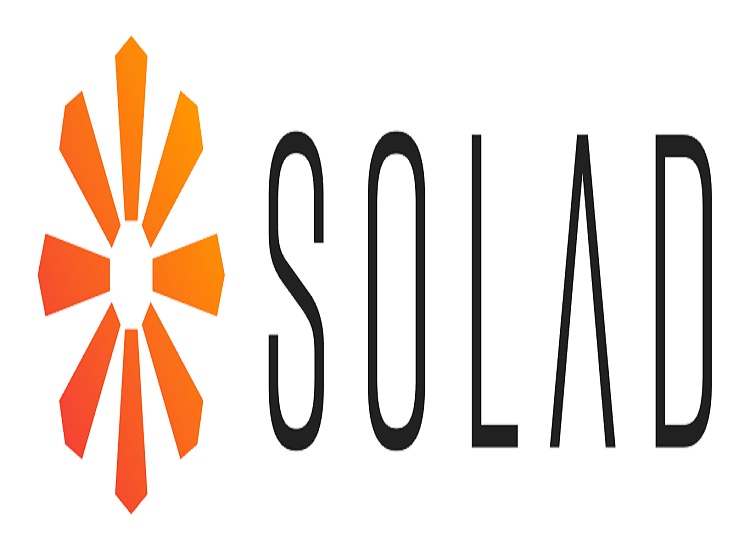News
Solad Partner Arizona State University to Scale up Feasibility Studies for Mini Grids

Solad Power Group, one of Nigeria’s leading distributed energy solutions providers, has agreed to partner with Arizona State University (ASU) to utilise the university’s proprietary artificial intelligence data platform to assess mini-grid projects in Nigeria quickly and efficiently.

The partnership with ASU’s Laboratory For Energy And Power Solutions (LEAPS) enables the accelerated deployment of 25 new sites. Data will be collected through LEAPS’ existing partnerships with YouthMappers and Nigerian universities, whose students will deepen their knowledge of and exposure to distributed energy solutions.
Mini-grid companies must conduct site feasibility studies before they can design and install a project. This is often a limited but protracted process built on insufficient data from short site visits, which can compromise the outcome.
Solad is focused on leveraging the latest technology to enhance its feasibility assessments using global satellite imagery, AI-aided mapping models and advanced power engineering software.
Commenting on the alliance, Solad’s Chairman Constantine ‘Labi Ogunbiyi said: “We are proud to be collaborating with the largest research university in the United States. By combining ASU’s unique data platform with our own project portfolio and market access, we can deliver new power solutions much more efficiently.
“This means we can rapidly expand and validate our project pipeline while ASU grows its knowledge and understanding of market viability with Nigerian students participating in the process.
“Once the first phase is successful, we intend to expand collaboration to include hundreds of additional sites. Using ASU’s accurate technical and business data metrics, we will continue to invest in energy as a service allowing us to connect Nigerian MSMEs to the world, beginning with clean energy systems providing consistent power supply, and expanding our services through a mobile first, digital eCommerce portal.”
Dr. Nathan Johnson, Director of ASU LEAPS, remarks about the importance of innovation and partnerships: “The public-private partnership with Solad will accelerate identification and development of mini-grid sites to expand access to reliable, affordable, and renewable energy.
“The technical analysis provided by ASU is paired with innovative business models by Solad to create bankable mini-grid investments that address the goals of all stakeholders.
“Solad’s approach provides a tangible return on investment to facilitate site expansion and economic development.”

Solad focuses on under-served segments of the energy market, prioritising support for the millions of market traders who struggle with access to unreliable or prohibitively-expensive energy solutions. SMEs make up 96% of all businesses operating in Nigeria, contributing nearly 50% of GDP and providing 84% of all jobs in the country.
They consistently reference access to electricity as the single most important obstacle that they face. With Lagos alone having a population of 20 million people, the opportunity set is huge.
Solad already has 10,000 existing small business customers and an expansion programme that targets an additional 20,000 businesses within 2 years.
News
NITDA Urges Stronger State Partnerships as Key to Digital Economy Goals @ South-South Stakeholders Forum

Kashifu Inuwa, Director General of the National Information Technology Development Agency (NITDA), has underscored the importance of deeper collaboration with state governments, saying sub-national alignment is essential to achieving Nigeria’s digital economy objectives.

He spoke online at the South-South Regional ICT Stakeholders Forum, which brought together policymakers, technology leaders, civil society organisations and ecosystem players to chart a path for accelerated digital development across the region.
The NITDA boss noted that while the Agency has made notable progress at the federal level, the real measure of success lies in how effectively national policies are translated into actionable programmes within states. According to him, digital transformation can only be sustained when states domesticate policies and establish clear implementation structures.
He referenced key frameworks, including the Nigerian Startup Act and the National Digital Literacy Framework, observing that although several states have created ICT-focused ministries and agencies, some still lack comprehensive enabling laws and structured governance mechanisms. NITDA, he assured, remains ready to provide technical guidance to states seeking to strengthen their digital ecosystems.
Digital literacy, he stressed, remains central to inclusive growth. Under the National Digital Literacy Framework, NITDA aims to achieve 95 per cent digital literacy nationwide by 2030. Working with the Federal Ministry of Education, digital skills have been embedded in school curricula, with teachers across the country undergoing capacity-building programmes to support technology-driven learning. States in the South-South were encouraged to ensure that educators in both public and private schools fully participate in the initiative.
The DG also highlighted ongoing efforts to upskill public servants. In collaboration with the Office of the Head of the Civil Service of the Federation, more than 54,000 federal civil servants have enrolled in structured digital skills training. Similar programmes, he said, are being considered for rollout across South-South states to enhance governance efficiency and public service delivery.
On partnerships, Inuwa pointed to collaborations with Cisco, which provide access to self-paced digital courses, and the National Youth Service Corps (NYSC), whose digital champions conduct community-based sensitisation in markets, worship centres, motor parks and among senior citizens. He urged stakeholders in the zone to strengthen coordination and co-create practical initiatives to expand digital inclusion.
In his contribution, the Commissioner for Science, Technology and Innovation in Cross River State, Dr Justin Atiang Beshel, reaffirmed the state’s resolve to leverage technology for sustainable development.
He said Cross River is prioritising broadband expansion and digital infrastructure as the backbone of e-government services, skills development, innovation and job creation. Improved connectivity, he noted, would unlock economic opportunities and enhance service delivery statewide.
Despite challenges such as limited rural connectivity and funding constraints for large-scale ICT projects, the Commissioner expressed optimism about strategic partnerships. He described collaboration with NITDA and private sector players as critical to narrowing the digital divide, boosting cybersecurity resilience and ensuring inclusive participation in the digital economy.
Beshel maintained that sustained investment and coordinated action would position Cross River as a competitive digital hub within Nigeria’s growing technology landscape.
News
ABoICT Lecture 2026 to Focus on Impact of AI, IoT on Business Operational Efficiency

Board and management of Communication Week Media Limited, publishers of Nigeria CommunicationsWeek, at the weekend announced that this year’s Africa’s Beacon of ICT Merit and Leadership lecture will focus on Impact of AI and IoT on business operational efficiency.

Africa’s Beacon of ICT Merit and Leadership lecture, widely regarded as the most prestigious annual event available in the ICT industry in Nigeria is in its 17th year.
The lecture holds on May 30, 2026 at Oriental Hotel Lekki, Lagos, according Ken Nwogbo, editor-in-chief of
Nigeria CommunicationsWeek the organizers of the event.
He said that this year’s event “is digital transformation edition” to recognise and celebrate organizations and individuals in the ICT industry that have impacted in digital transformation of the economy.
“Most of these organizations and individuals have consistently being voted by our readers as leaders in their areas of operations and we have decided to reward them in this special edition, tag: ‘Digital Transformation Edition 2026’ he said,”.
He added that, Digital transformation, driven by AI and IoT, will fundamentally boosts business operational efficiency by automating complex tasks, enabling real-time data analysis, and reducing costs.
“IoT technology optimizes resources, predict maintenance needs, and enhance decision- making, allowing companies to streamline workflows and improve productivity across sectors like manufacturing and logistics.
“It is an emerging technology that has impacted lifestyles and has changed the way we think and act, and the way we interact with each other.
It has also changed the way we work as it enables very large-scale monitoring, control, and automation, and has impacted the digital transformation of organizations in different industries”, he said.
According to him, “the transformative power of Artificial Intelligence exists as a bringing force in organizational communication. AI tools perform repetitive jobs, deliver simultaneous translations, and register team communication patterns, which lead to better understanding of group interactions. AI chatbots help manage customer support inquiries thus enabling staff members to dedicate their efforts toward complex work activities”.
The Africa’s Beacon of ICT Merit and Leadership Distinguished (ABoICT Lecture 2026) is designed to explore efforts to put Nigeria on the global Information and Communications Technologies map.
The lecture series however is reserved for distinguished achievers in the ICT sector.
Past lecturers included Dr. Ernest Ndukwe, then executive vice chairman, Nigeria Communications Commission (NCC); Uche Orji, managing director/chief executive officer, Nigeria Sovereign Investment Authority (NSIA); Biodu Omoniyi, Managing Director/CEO, VDT Communications; Ayotunde Coker, former Managing Director, Rack Centre Limited; Prof. Adewale Obadare, chief visionary officer, Digital Encode; Dr. Oluseyi Akindeinde, founder,
Hyperspace & NeuraL AI and John Obaro, CEO and founder of Systemspecs; Prof. Isa Pantanmi, former minister of Communications and Digital Economy; among others.
News
AI-Driven Memory Chip Fuels Global Phone Price Surge

Global technology markets are entering a new phase of strain as surging memory chip prices intensify the ongoing semiconductor shortage. For Nigeria, the ripple effects could translate into a 15 – 20 per cent increase in phone price levels if supply pressures persist into the next quarter.

While attention has largely focused on advanced AI processors, the sharpest escalation is occurring in memory chips, specifically DRAM (Dynamic Random Access Memory) and NAND (Flash Memory), which are essential to smartphones, PCs, and vehicles.
According to Bloomberg data, spot prices for DRAM have surged more than 600 percent in recent months. NAND prices have also climbed as artificial intelligence infrastructure expands global storage demand.
This shift reflects a structural realignment rather than a short-term disruption.
Massive AI infrastructure investments led by hyperscalers such as Amazon have redirected fabrication capacity toward high-bandwidth memory (HBM), a critical component for AI accelerators. This shift has tightened supply for conventional memory used in consumer devices.
Market analysts now describe the situation as a memory “supercycle,” breaking the industry’s traditional boom-and-bust pattern. Historically, memory cycles lasted three to four years. According to Jian Shi Cortesi of GAM Investment Management, the current cycle has already exceeded previous ones “both in length and magnitude,” with little evidence of demand momentum softening.
Financial markets reflect the divide. A Bloomberg gauge of global consumer electronics makers has fallen roughly 10 per cent since late September, while a basket of memory manufacturers has surged about 160 per cent over the same period. Shares of SK Hynix, a key high-bandwidth memory supplier to Nvidia, have climbed more than 150 per cent.
By contrast, downstream manufacturers reliant on affordable memory supplies are under pressure. Nintendo has warned of margin compression linked to shortages. Qualcomm shares declined after signaling memory constraints that could limit phone production. PC makers such as Lenovo and Dell have also retreated from recent peaks amid concerns that rising chip costs could dampen demand.
The divergence underscores a widening gap between component producers and device assemblers.
Memory is central to modern smartphone performance. Higher DRAM and NAND capacities power AI-enabled features, high-resolution imaging, and multitasking capabilities. Rising memory costs, therefore, feed directly into the bill of materials.
Even in a moderate demand environment, a constrained memory supply can limit production volumes. Qualcomm’s recent indication that memory shortages may restrict handset output highlights the risk of scarcity extending beyond price increases into availability challenges.
Compounding the issue, a foundry such as TSMC is prioritising higher-margin AI-related contracts at advanced nodes. Combined with the reallocation of capacity toward high-bandwidth memory, this limits flexibility in supplying traditional mobile processors and storage components.
For Nigeria, the likely outcome is not immediate widespread stockouts, but gradual upward revisions in retail pricing.
Nigeria’s electronics market remains heavily import-dependent, with minimal semiconductor manufacturing capacity. Retailers are therefore exposed to global cost shifts and supply volatility.
Distributors in major commercial hubs such as Lagos’ Computer Village are closely monitoring global trends. Some are securing inventory ahead of anticipated adjustments, while others are maintaining leaner procurement cycles to manage uncertainty.
Duration risk remains a key concern. Fidelity International’s Vivian Pai recently observed that while markets may be pricing in normalization within one to two quarters, industry tightness could persist through the rest of the year. If that proves accurate, manufacturers will have limited room to absorb higher component costs without passing them through to consumers.
Mid-tier smartphones, especially those balancing affordability with competitive performance, are likely to face the greatest pressure. Manufacturers may respond by offering lower base storage variants, delaying feature upgrades, or raising prices incrementally across product lines.
Parallel imports could increase if global scarcity intensifies, potentially raising concerns about warranty coverage and after-sales support.
Globally, firms are attempting to mitigate exposure by locking in long-term supply contracts, raising product prices, or redesigning devices to use less memory. However, semiconductor fabrication is capital-intensive and slow to scale. New fabrication plants require years to build, and expanding high-bandwidth memory output involves complex processes that cannot be rapidly accelerated.
For Nigeria, the episode underscores the importance of strengthening digital resilience. While domestic chip fabrication remains unlikely in the near term, expanding local device assembly, promoting repair ecosystems, and supporting component recycling could help cushion future supply shocks.
If projections hold, Nigerian buyers may begin seeing incremental price adjustments within weeks. Mid-range Android devices are likely to record the most noticeable changes, while premium models, already positioned at higher price points, may see more measured increases.
As it stands, AI’s explosive growth is reshaping semiconductor allocation patterns, and memory, once viewed as a product with prices that rise and fall in cycles, is behaving like a sustained constraint.
The widening gap between stock market winners and losers reflects the magnitude of this transition. As AI infrastructure spending accelerates globally, consumer electronics markets, including Nigeria’s, must adjust to a new cost environment.
Whether the squeeze proves temporary or evolves into a prolonged recalibration will depend on how quickly semiconductor capacity expands. For now, the trajectory suggests continued upward pressure on global electronics pricing, and Nigeria’s phone price expectations may have to adjust accordingly.

 News2 days ago
News2 days agoABoICT Lecture 2026 to Focus on Impact of AI, IoT on Business Operational Efficiency

 General News2 days ago
General News2 days agoLeo Stan @ 70: Blessed and Bruised by Country, Eyes Next Disruption

 General News2 days ago
General News2 days agoZinox Technologies and TD Africa Forge Strategic Partnership to Revolutionize African Tech Ecosystem

 Telecom2 days ago
Telecom2 days agoUwaje Pays Tribute to Leo Stan Ekeh @70

 E-Financial1 day ago
E-Financial1 day ago$214Bn Missing, Institutions Silent: Is Accountability Dead in Nigeria?

 Telecom1 day ago
Telecom1 day agoCyber Immunity Emerges as Shield for Nigerians Amid Rising Scams

 General News1 day ago
General News1 day agoNITDA, Abia Partner on Enterprise Architecture Reform

 E-Business1 day ago
E-Business1 day agoInterswitch Partners Abia to Digitise Public Hospitals


















